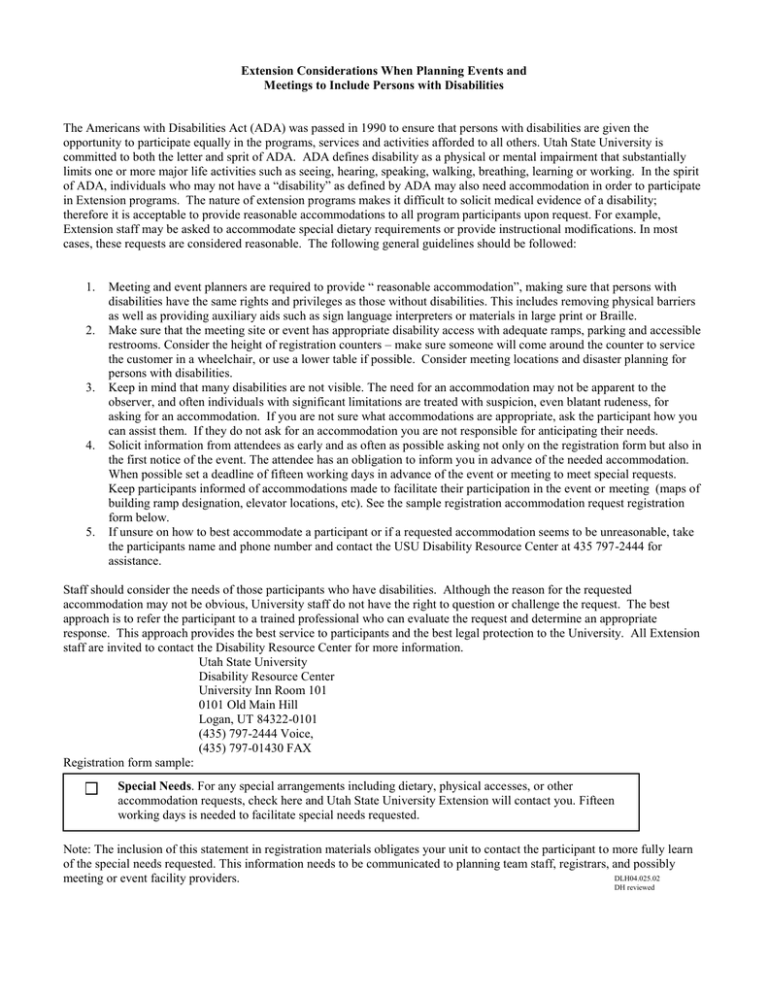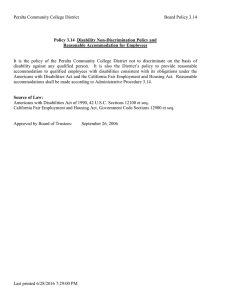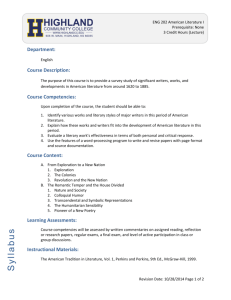Extension Considerations When Planning Events and
advertisement

Extension Considerations When Planning Events and Meetings to Include Persons with Disabilities The Americans with Disabilities Act (ADA) was passed in 1990 to ensure that persons with disabilities are given the opportunity to participate equally in the programs, services and activities afforded to all others. Utah State University is committed to both the letter and sprit of ADA. ADA defines disability as a physical or mental impairment that substantially limits one or more major life activities such as seeing, hearing, speaking, walking, breathing, learning or working. In the spirit of ADA, individuals who may not have a “disability” as defined by ADA may also need accommodation in order to participate in Extension programs. The nature of extension programs makes it difficult to solicit medical evidence of a disability; therefore it is acceptable to provide reasonable accommodations to all program participants upon request. For example, Extension staff may be asked to accommodate special dietary requirements or provide instructional modifications. In most cases, these requests are considered reasonable. The following general guidelines should be followed: 1. 2. 3. 4. 5. Meeting and event planners are required to provide “ reasonable accommodation”, making sure that persons with disabilities have the same rights and privileges as those without disabilities. This includes removing physical barriers as well as providing auxiliary aids such as sign language interpreters or materials in large print or Braille. Make sure that the meeting site or event has appropriate disability access with adequate ramps, parking and accessible restrooms. Consider the height of registration counters – make sure someone will come around the counter to service the customer in a wheelchair, or use a lower table if possible. Consider meeting locations and disaster planning for persons with disabilities. Keep in mind that many disabilities are not visible. The need for an accommodation may not be apparent to the observer, and often individuals with significant limitations are treated with suspicion, even blatant rudeness, for asking for an accommodation. If you are not sure what accommodations are appropriate, ask the participant how you can assist them. If they do not ask for an accommodation you are not responsible for anticipating their needs. Solicit information from attendees as early and as often as possible asking not only on the registration form but also in the first notice of the event. The attendee has an obligation to inform you in advance of the needed accommodation. When possible set a deadline of fifteen working days in advance of the event or meeting to meet special requests. Keep participants informed of accommodations made to facilitate their participation in the event or meeting (maps of building ramp designation, elevator locations, etc). See the sample registration accommodation request registration form below. If unsure on how to best accommodate a participant or if a requested accommodation seems to be unreasonable, take the participants name and phone number and contact the USU Disability Resource Center at 435 797-2444 for assistance. Staff should consider the needs of those participants who have disabilities. Although the reason for the requested accommodation may not be obvious, University staff do not have the right to question or challenge the request. The best approach is to refer the participant to a trained professional who can evaluate the request and determine an appropriate response. This approach provides the best service to participants and the best legal protection to the University. All Extension staff are invited to contact the Disability Resource Center for more information. Utah State University Disability Resource Center University Inn Room 101 0101 Old Main Hill Logan, UT 84322-0101 (435) 797-2444 Voice, (435) 797-01430 FAX Registration form sample: Special Needs. For any special arrangements including dietary, physical accesses, or other accommodation requests, check here and Utah State University Extension will contact you. Fifteen working days is needed to facilitate special needs requested. Note: The inclusion of this statement in registration materials obligates your unit to contact the participant to more fully learn of the special needs requested. This information needs to be communicated to planning team staff, registrars, and possibly DLH04.025.02 meeting or event facility providers. DH reviewed

